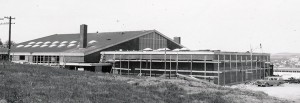On April 2, 1960, Wieden Hall was dedicated in honor of then President Clifford O.T. Wieden. The building included a gymnasium, classroom space, offices, and the University’s 400-seat auditorium.

Not only did the auditorium serve as the University’s largest lecture hall, it also became an important gathering place for campus events and a regional destination for visiting performers and speakers. Locals fondly remember the many productions the Pioneer Playhouse performed on the auditorium’s stage throughout the 1970s and 1980s. In addition, the Auditorium has long served as the spot where UMPI seniors conduct their graduation marching practice.
In recent years, the auditorium has been the performance space for the UMPI Community Band. In 2011, it also featured the hometown premiere of John Cariani’s Almost, Maine, which has become one of the most frequently produced plays in the United States, with over 70 professional productions and over 1500 community, high school, and university productions to date. And, in January 2013, the auditorium provided the backdrop for nationally acclaimed singer-songwriter Ellis Paul’s recent hometown performance.
Use of the space has decreased in recent years because of the facility’s deterioration. With strong community support, officials look forward to making the Auditorium Renovation Project a reality.
A brief history of the Pioneer Playhouse
Written by Joe Zubrick – April 1, 2009
This article first appeared in the Star-Herald as part of the commemoration of Presque Isle’s 150th anniversary
From 1973 until 1994, Aroostook County’s summer cultural scene was dominated, for the most part, by a single entity, the University of Maine at Presque Isle’s Pioneer Playhouse. Fashioned by John Sbordone as a complement to his new Association of the Performing Arts (later, the University Theater at UMPI), The Pioneer Playhouse was a unique amalgam of campus, community and guest talent that provided vivid entertainment for the County each year during the months of June, July and August. The Playhouse produced over eighty productions in its 21 year history, a mix of classical, contemporary and musical theater that set high standards for professionalism and creativity.
The Pioneer Playhouse is the enduring legacy of two men, John Sbordone and Dan Ladner. Sbordone, fresh from graduate study at the University of Indiana, brought his energy, vision and commitment to UMPI in 1973 and took a club activity, known then as Hudramatics, and turned it into a college theater program. He built the Pioneer Playhouse as a community based extension of the University Theater.
Happily, Sbordone’s vision found fertile ground provided by Dan Ladner’s success with the Shipmates’ Playhouse at Presque Isle High School. Easily one of the most enduring and successful of all Maine High School theater programs, PIHS provided talent for productions and a cultivated appreciation of theater in the audiences.
The names of the participants are well known to most theater goers in the area. Directors in the early years included John and his wife, Carole Sbordone, Ralph Fanelli, and Robert Loxley. Performers like Gerald Bussewitz, T.W. Morrison, Rick Solomon, Scott Spear, Dan Ladner, Melissa Wentworth, Deb McKenna and many others provided stellar memories. After Sbordone’s departure in 1982, he was followed by Don Rowe, Kaarin Johnston and Joe Zubrick, Dennis Wemm and Rick Asam. New performers joined the old, Rick Landeen, Cissy Libby, Wendy Gilman, John and Melinda Wolfe, Brian and Melanie Sipe, Dan’s daughters, Beth and Tammy Ladner, John Cariani, Jennifer Roe, George Hall, Holly Cones, Hilary Benn, John Doane, Russ Rattray, Jim Derosier, Rose Sweeney and David Jackins.
And the productions, OLIVER, THE MUSIC MAN, GUYS AND DOLLS, YOU’RE A GOOD MAN CHARLIE BROWN, OKLAHOMA, ON GOLDEN POND, HELLO,DOLLY, A FUNNY THING HAPPENED ON THE WAY TO THE FORUM, A THOUSAND CLOWNS, SLEUTH, MAME, GYPSY, FIDDLER ON THE ROOF, THE HOUSE OF BLUE LEAVES, A MY NAME IS ALICE AND NUNSENSE II- all left the audiences with the twin emotions of being perfectly satisfied but always wanting more.
Eventually, the Playhouse lost its hold on the audiences. Newer entertainments and venues arose that eroded its base. But for the majority of its twenty one year history, the Pioneer Playhouse stood alone. It is both fondly remembered and dearly missed.